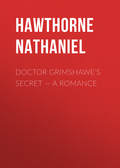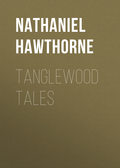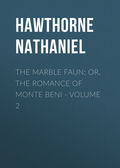
Натаниель Готорн
Septimius Felton, or, the Elixir of Life
Some of the company laughed.
"That must have been a curious sight," quoth the doctor.
"It is not well," said the minister seriously to the doctor, "to stir up these old remembrances, making the poor old lady appear absurd. I know not that she need to be ashamed of showing the weaknesses of the generation to which she belonged; but I do not like to see old age put at this disadvantage among the young."
"Nay, my good and reverend sir," returned the doctor, "I mean no such disrespect as you seem to think. Forbid it, ye upper powers, that I should cast any ridicule on beliefs,–superstitions, do you call them?–that are as worthy of faith, for aught I know, as any that are preached in the pulpit. If the old lady would tell me any secret of the old Felton's science, I shall treasure it sacredly; for I interpret these stories about his miraculous gifts as meaning that he had a great command over natural science, the virtues of plants, the capacities of the human body."
"While these things were passing, or before they passed, or some time in that eventful night, Septimius had withdrawn to his study, when there was a low tap at the door, and, opening it, Sibyl Dacy stood before him. It seemed as if there had been a previous arrangement between them; for Septimius evinced no surprise, only took her hand and drew her in.
"How cold your hand is!" he exclaimed. "Nothing is so cold, except it be the potent medicine. It makes me shiver."
"Never mind that," said Sibyl. "You look frightened at me."
"Do I?" said Septimius. "No, not that; but this is such a crisis; and methinks it is not yourself. Your eyes glare on me strangely."
"Ah, yes; and you are not frightened at me? Well, I will try not to be frightened at myself. Time was, however, when I should have been."
She looked round at Septimius's study, with its few old books, its implements of science, crucibles, retorts, and electrical machines; all these she noticed little; but on the table drawn before the fire, there was something that attracted her attention; it was a vase that seemed of crystal, made in that old fashion in which the Venetians made their glasses,–a most pure kind of glass, with a long stalk, within which was a curved elaboration of fancy-work, wreathed and twisted. This old glass was an heirloom of the Feltons, a relic that had come down with many traditions, bringing its frail fabric safely through all the perils of time, that had shattered empires; and, if space sufficed, I could tell many stories of this curious vase, which was said, in its time, to have been the instrument both of the Devil's sacrament in the forest, and of the Christian in the village meeting-house. But, at any rate, it had been a part of the choice household gear of one of Septimius's ancestors, and was engraved with his arms, artistically done.
"Is that the drink of immortality?" said Sibyl.
"Yes, Sibyl," said Septimius. "Do but touch the goblet; see how cold it is."
She put her slender, pallid fingers on the side of the goblet, and shuddered, just as Septimius did when he touched her hand.
"Why should it be so cold?" said she, looking at Septimius.
"Nay, I know not, unless because endless life goes round the circle and meets death, and is just the same with it. O Sibyl, it is a fearful thing that I have accomplished! Do you not feel it so? What if this shiver should last us through eternity?"
"Have you pursued this object so long," said Sibyl, "to have these fears respecting it now? In that case, methinks I could be bold enough to drink it alone, and look down upon you, as I did so, smiling at your fear to take the life offered you."
"I do not fear," said Septimius; "but yet I acknowledge there is a strange, powerful abhorrence in me towards this draught, which I know not how to account for, except as the reaction, the revulsion of feeling, consequent upon its being too long overstrained in one direction. I cannot help it. The meannesses, the littlenesses, the perplexities, the general irksomeness of life, weigh upon me strangely. Thou didst refuse to drink with me. That being the case, methinks I could break the jewelled goblet now, untasted, and choose the grave as the wiser part."
"The beautiful goblet! What a pity to break it!" said Sibyl, with her characteristic malign and mysterious smile. "You cannot find it in your heart to do it."
"I could,–I can. So thou wilt not drink with me?"
"Do you know what you ask?" said Sibyl. "I am a being that sprung up, like this flower, out of a grave; or, at least, I took root in a grave, and, growing there, have twined about your life, until you cannot possibly escape from me. Ah, Septimius! you know me not. You know not what is in my heart towards you. Do you remember this broken miniature? would you wish to see the features that were destroyed when that bullet passed? Then look at mine!"
"Sibyl! what do you tell me? Was it you–were they your features–which that young soldier kissed as he lay dying?"
"They were," said Sibyl. "I loved him, and gave him that miniature, and the face they represented. I had given him all, and you slew him."
"Then you hate me," whispered, Septimius.
"Do you call it hatred?" asked Sibyl, smiling. "Have I not aided you, thought with you, encouraged you, heard all your wild ravings when you dared to tell no one else? kept up your hopes; suggested; helped you with my legendary lore to useful hints; helped you, also, in other ways, which you do not suspect? And now you ask me if I hate you. Does this look like it?"
"No," said Septimius. "And yet, since first I knew you, there has been something whispering me of harm, as if I sat near some mischief. There is in me the wild, natural blood of the Indian, the instinctive, the animal nature, which has ways of warning that civilized life polishes away and cuts out; and so, Sibyl, never did I approach you, but there were reluctances, drawings back, and, at the same time, a strong impulse to come closest to you; and to that I yielded. But why, then, knowing that in this grave lay the man you loved, laid there by my hand,–why did you aid me in an object which you must have seen was the breath of my life?"
"Ah, my friend,–my enemy, if you will have it so,–are you yet to learn that the wish of a man's inmost heart is oftenest that by which he is ruined and made miserable? But listen to me, Septimius. No matter for my earlier life; there is no reason why I should tell you the story, and confess to you its weakness, its shame. It may be, I had more cause to hate the tenant of that grave, than to hate you who unconsciously avenged my cause; nevertheless, I came here in hatred, and desire of revenge, meaning to lie in wait, and turn your dearest desire against you, to eat into your life, and distil poison into it, I sitting on this grave, and drawing fresh hatred from it; and at last, in the hour of your triumph, I meant to make the triumph mine."
"Is this still so?" asked Septimius, with pale lips: "or did your fell purpose change?"
"Septimius, I am weak,–a weak, weak girl,–only a girl, Septimius; only eighteen yet," exclaimed Sibyl. "It is young, is it not? I might be forgiven much. You know not how bitter my purpose was to you. But look, Septimius,–could it be worse than this? Hush, be still! Do not stir!"
She lifted the beautiful goblet from the table, put it to her lips, and drank a deep draught from it; then, smiling mockingly, she held it towards him.
"See; I have made myself immortal before you. Will you drink?"
He eagerly held out his hand to receive the goblet, but Sibyl, holding it beyond his reach a moment, deliberately let it fall upon the hearth, where it shivered into fragments, and the bright, cold water of immortality was all spilt, shedding its strange fragrance around.
"Sibyl, what have you done?" cried Septimius in rage and horror.
"Be quiet! See what sort of immortality I win by it,–then, if you like, distil your drink of eternity again, and quaff it."
"It is too late, Sibyl; it was a happiness that may never come again in a lifetime. I shall perish as a dog does. It is too late!"
"Septimius," said Sibyl, who looked strangely beautiful, as if the drink, giving her immortal life, had likewise the potency to give immortal beauty answering to it, "listen to me. You have not learned all the secrets that lay in those old legends, about which we have talked so much. There were two recipes, discovered or learned by the art of the studious old Gaspar Felton. One was said to be that secret of immortal life which so many old sages sought for, and which some were said to have found; though, if that were the case, it is strange some of them have not lived till our day. Its essence lay in a certain rare flower, which mingled properly with other ingredients of great potency in themselves, though still lacking the crowning virtue till the flower was supplied, produced the drink of immortality."
"Yes, and I had the flower, which I found in a grave," said Septimius, "and distilled the drink which you have spilt."
"You had a flower, or what you called a flower," said the girl. "But, Septimius, there was yet another drink, in which the same potent ingredients were used; all but the last. In this, instead of the beautiful flower, was mingled the semblance of a flower, but really a baneful growth out of a grave. This I sowed there, and it converted the drink into a poison, famous in old science,–a poison which the Borgias used, and Mary de Medicis,–and which has brought to death many a famous person, when it was desirable to his enemies. This is the drink I helped you to distil. It brings on death with pleasant and delightful thrills of the nerves. O Septimius, Septimius, it is worth while to die, to be so blest, so exhilarated as I am now."
"Good God, Sibyl, is this possible?"
"Even so, Septimius. I was helped by that old physician, Doctor Portsoaken, who, with some private purpose of his own, taught me what to do; for he was skilled in all the mysteries of those old physicians, and knew that their poisons at least were efficacious, whatever their drinks of immortality might be. But the end has not turned out as I meant. A girl's fancy is so shifting, Septimius. I thought I loved that youth in the grave yonder; but it was you I loved,–and I am dying. Forgive me for my evil purposes, for I am dying."
"Why hast thou spilt the drink?" said Septimius, bending his dark brows upon her, and frowning over her. "We might have died together."
"No, live, Septimius," said the girl, whose face appeared to grow bright and joyous, as if the drink of death exhilarated her like an intoxicating fluid. "I would not let you have it, not one drop. But to think," and here she laughed, "what a penance,–what months of wearisome labor thou hast had,–and what thoughts, what dreams, and how I laughed in my sleeve at them all the time! Ha, ha, ha! Then thou didst plan out future ages, and talk poetry and prose to me. Did I not take it very demurely, and answer thee in the same style? and so thou didst love me, and kindly didst wish to take me with thee in thy immortality. O Septimius, I should have liked it well! Yes, latterly, only, I knew how the case stood. Oh, how I surrounded thee with dreams, and instead of giving thee immortal life, so kneaded up the little life allotted thee with dreams and vaporing stuff, that thou didst not really live even that. Ah, it was a pleasant pastime, and pleasant is now the end of it. Kiss me, thou poor Septimius, one kiss!"
[She gives the ridiculous aspect to his scheme, in an airy way.]
But as Septimius, who seemed stunned, instinctively bent forward to obey her, she drew back. "No, there shall be no kiss! There may a little poison linger on my lips. Farewell! Dost thou mean still to seek for thy liquor of immortality?–ah, ah! It was a good jest. We will laugh at it when we meet in the other world."
And here poor Sibyl Dacy's laugh grew fainter, and dying away, she seemed to die with it; for there she was, with that mirthful, half-malign expression still on her face, but motionless; so that however long Septimius's life was likely to be, whether a few years or many centuries, he would still have her image in his memory so. And here she lay among his broken hopes, now shattered as completely as the goblet which held his draught, and as incapable of being formed again.
The next day, as Septimius did not appear, there was research for him on the part of Doctor Portsoaken. His room was found empty, the bed untouched. Then they sought him on his favorite hill-top; but neither was he found there, although something was found that added to the wonder and alarm of his disappearance. It was the cold form of Sibyl Dacy, which was extended on the hillock so often mentioned, with her arms thrown over it; but, looking in the dead face, the beholders were astonished to see a certain malign and mirthful expression, as if some airy part had been played out,–some surprise, some practical joke of a peculiarly airy kind had burst with fairy shoots of fire among the company.
"Ah, she is dead! Poor Sibyl Dacy!" exclaimed Doctor Portsoaken. "Her scheme, then, has turned out amiss."
This exclamation seemed to imply some knowledge of the mystery; and it so impressed the auditors, among whom was Robert Hagburn, that they thought it not inexpedient to have an investigation; so the learned doctor was not uncivilly taken into custody and examined. Several interesting particulars, some of which throw a certain degree of light on our narrative, were discovered. For instance, that Sibyl Dacy, who was a niece of the doctor, had been beguiled from her home and led over the sea by Cyril Norton, and that the doctor, arriving in Boston with another regiment, had found her there, after her lover's death. Here there was some discrepancy or darkness in the doctor's narrative. He appeared to have consented to, or instigated (for it was not quite evident how far his concurrence had gone) this poor girl's scheme of going and brooding over her lover's grave, and living in close contiguity with the man who had slain him. The doctor had not much to say for himself on this point; but there was found reason to believe that he was acting in the interest of some English claimant of a great estate that was left without an apparent heir by the death of Cyril Norton, and there was even a suspicion that he, with his fantastic science and antiquated empiricism, had been at the bottom of the scheme of poisoning, which was so strangely intertwined with Septimius's notion, in which he went so nearly crazed, of a drink of immortality. It was observable, however, that the doctor–such a humbug in scientific matters, that he had perhaps bewildered himself–seemed to have a sort of faith in the efficacy of the recipe which had so strangely come to light, provided the true flower could be discovered; but that flower, according to Doctor Portsoaken, had not been seen on earth for many centuries, and was banished probably forever. The flower, or fungus, which Septimius had mistaken for it, was a sort of earthly or devilish counterpart of it, and was greatly in request among the old poisoners for its admirable uses in their art. In fine, no tangible evidence being found against the worthy doctor, he was permitted to depart, and disappeared from the neighborhood, to the scandal of many people, unhanged; leaving behind him few available effects beyond the web and empty skin of an enormous spider.
As to Septimius, he returned no more to his cottage by the wayside, and none undertook to tell what had become of him; crushed and annihilated, as it were, by the failure of his magnificent and most absurd dreams. Rumors there have been, however, at various times, that there had appeared an American claimant, who had made out his right to the great estate of Smithell's Hall, and had dwelt there, and left posterity, and that in the subsequent generation an ancient baronial title had been revived in favor of the son and heir of the American. Whether this was our Septimius, I cannot tell; but I should be rather sorry to believe that after such splendid schemes as he had entertained, he should have been content to settle down into the fat substance and reality of English life, and die in his due time, and be buried like any other man.
A few years ago, while in England, I visited Smithell's Hall, and was entertained there, not knowing at the time that I could claim its owner as my countryman by descent; though, as I now remember, I was struck by the thin, sallow, American cast of his face, and the lithe slenderness of his figure, and seem now (but this may be my fancy) to recollect a certain Indian glitter of the eye and cast of feature.
As for the Bloody Footstep, I saw it with my own eyes, and will venture to suggest that it was a mere natural reddish stain in the stone, converted by superstition into a Bloody Footstep.






